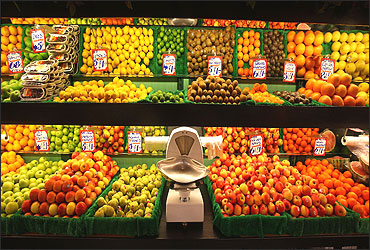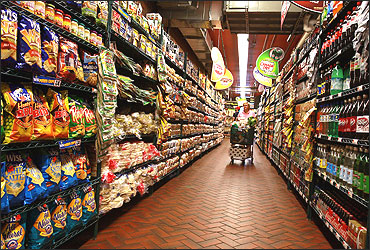 | « Back to article | Print this article |
Food inflation rises to 9.80% for week ended Aug 13
Inching closer to the crucial double-digit mark, food inflation rose to 9.80 per cent for the week ended August 13 on the back of dearer onions, potatoes, fruits and protein-based items.
Food inflation, as measured by Whole Price Index (WPI), stood at 9.03 per cent in the previous week. The rate of price rise of food items in the corresponding week of August, 2010, was 14.56 per cent.
As per data released by the government on Thursday, the price of onions soared by 44.42 per cent year-on-year, while potatoes became 16.39 per cent more expensive during the week under review.
During the week ended August 13, fruits became dearer by 27.01 per cent and eggs, meat and fish by 13.37 per cent on an annual basis.
Click on NEXT for more...
Food inflation rises to 9.80% for week ended Aug 13
The price of milk was up 9.51 per cent, while vegetables and cereals became dearer by 6.52 per cent and 5.22 per cent, respectively.
However, pulses became cheaper by 5.56 per cent and the price of wheat was down by 2.80 per cent year-on-year.
Overall, primary articles recorded 12.40 per cent inflation for the week ended August 13, up from 11.64 per cent in the previous week. Primary articles have a share of over 20 per cent in the WPI.
Inflation in non-food articles, which include fibres, oil seeds and minerals, stood at 17.80 per cent, compared to 16.07 per cent in the previous week.
Click on NEXT for more...
Food inflation rises to 9.80% for week ended Aug 13
Meanwhile, fuel and power inflation stood stable at 13.13 per cent for the week ended August 13, the same as in the week ended August 6.
Seeking to allay concerns over the rate of price rise, Prime Minister Manmohan Singh had yesterday expressed confidence that headline inflation would come down to 6 per cent by the year-end.
"I am not an astrologer, but analysts have said that by the end of this year, inflation will come down to 6 per cent," Singh had said during an Iftar dinner hosted by him.
Headline inflation, which also factors in manufactured items, fuels and non-food primary items, besides food, stood at 9.22 per cent in June.
The Reserve Bank has already hiked interest rates 11 times since March, 2010, to tame demand and curb inflation.
Click on NEXT for more...
Food inflation rises to 9.80% for week ended Aug 13
The RBI and the Prime Minister's Economic Advisory Council had projected headline inflation to remain high at around 9 per cent till October.
Food inflation was in double digits for most of 2010, but started to moderate from March this year.
It fell to 7.33 per cent in mid-July, before again rising to a four-and-a-half month high of 9.90 per cent in end-July.
The rate of price rise of food items has been highly volatile in the past few weeks.
In its Economic Outlook for 2011-12 released earlier this month, the PMEAC said that while pressure from food inflation has fallen in recent months, the rate of price rice still remains quite high, with the possibility of a further surge in coming months.



